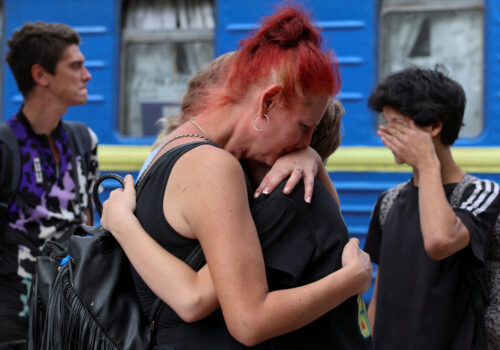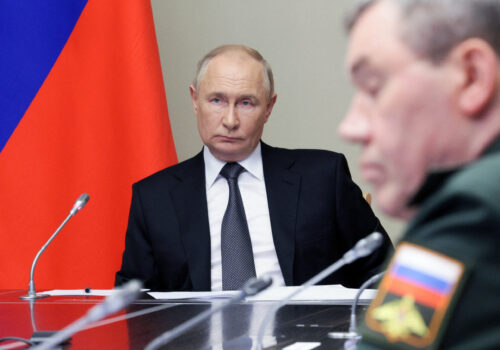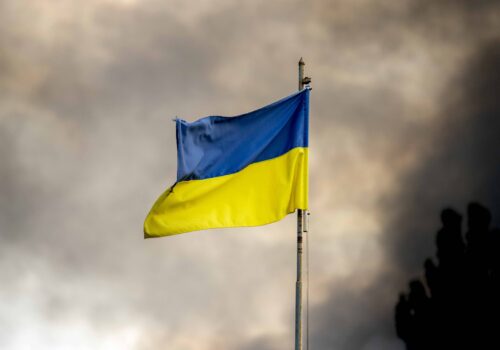When Vladimir Putin first began the invasion of Ukraine with the seizure of Crimea, he did so using troops without identifying insignia and was careful to hide his attack behind a veil of deniability, however implausible. Ten years later, the Russian dictator now routinely threatens Western leaders with nuclear apocalypse if they dare to disrupt his methodical destruction of Europe’s largest nation. This dramatic escalation in Russian aggression is the bitter fruit of a decade spent trying to avoid provoking Putin rather than confronting the Kremlin.
In 2014, the West chose not to impose any significant costs on Russia for the occupation of Crimea and the subsequent invasion of eastern Ukraine’s Donbas region. At the time, many preferred to pursue a business as usual approach, strengthening trade ties with Moscow and constructing new gas pipelines to deepen Europe’s energy dependence on the Kremlin. Unsurprisingly, Putin interpreted this timidity as a tacit green light to continue, safe in the knowledge that performative Western outrage was unlikely to translate into action. The stage was thus set for the largest European invasion since World War II.
Since February 2022, Russia’s full-scale invasion of Ukraine has transformed the geopolitical landscape, but it has so far failed to convince Western leaders of the need to abandon their failed policies of escalation management. Instead, the international response to Russia’s invasion has been hampered at every turn by delays and indecisiveness, with Kyiv’s partners denying the country vital weapons and imposing absurd restrictions on Ukraine’s ability to defend itself. As a result, the Ukrainian military currently finds itself forced to fight an existential war with one hand tied behind its back.
Stay updated
As the world watches the Russian invasion of Ukraine unfold, UkraineAlert delivers the best Atlantic Council expert insight and analysis on Ukraine twice a week directly to your inbox.
We have been here before, of course. In the 1930s, Western leaders responded to the challenge of an increasingly aggressive Nazi Germany by seeking to appease Adolf Hitler with a series of concessions. The architects of appeasement have come to be viewed as fools and cowards, but in fact they were mostly honorable men who believed it was their sacred duty to prevent another world war. The majority of today’s escalation managers are doubtless driven by similarly noble intentions. However, it should be painfully clear to them by now that escalation management is the appeasement of the modern era and is steadily creating the conditions for the global conflict they aim to avert.
Like Hitler before him, Putin makes no secret of his expansionist goals and imperial ambitions. Indeed, the Kremlin dictator likes nothing better than discussing his sense of historical mission. He is notorious for delivering rambling lectures on Russian history, and has often delved into the distant past to justify his contemporary geopolitical grievances. Ukraine is a favorite topic, with Putin frequently questioning the legitimacy of Ukrainian statehood and referring to entire regions of Ukraine as “historically Russian lands.” Few were surprised in summer 2022 when he compared the current invasion of Ukraine to the eighteenth century imperial conquests of Russian Czar Peter the Great.
Nor is Putin’s historical revisionism limited to the reconquest of Ukraine. He has often lamented modern Russia’s retreat from empire and has referred to the 1991 fall of the Soviet Union as the “disintegration of historical Russia.” At its greatest extent, the Russian Empire stretched far beyond today’s Ukrainian borders and featured a long list of additional countries including Finland, Poland, the Baltic states, Belarus, Moldova, Georgia, Armenia, Azerbaijan, and the whole of Central Asia. Many of these states could be at risk of suffering Ukraine’s fate if the current invasion is allowed to succeed.
Eurasia Center events

While there can be little doubt regarding the scale of Putin’s revisionist ambitions, some skeptics still question whether he possesses the military capabilities to achieve his goals. This is shortsighted. The invasion of Ukraine may have exposed the limitations of the Russian army, but it has also revealed the weakness of the West. This disastrous lack of Western resolve is visibly emboldening the Kremlin and may yet persuade Putin that he can risk going further without triggering an overwhelming Western response.
In recent months, Putin has begun testing NATO with occasional drone incursions across the border into Poland, Romania, and the Baltic states. So far, he has received minimal push back. This gray zone aggression is just one small part of an escalating Russian hybrid war being waged throughout the Western world that includes a dizzying array of disinformation operations, cyber attacks, weaponized corruption, sabotage, and support for extremist political movements of all kinds. Although many policymakers in Western capitals are still reluctant to admit it, Russia evidently believes it is already at war with the West and is acting accordingly.
Back in the Russian Federation itself, there are ample indications that Putin is preparing the domestic front for a long war. He has placed the entire Russian economy on a wartime footing, and has instructed his vast propaganda apparatus to preach holy war against the West. On the international stage, he is consolidating an authoritarian axis of like-minded nations such as China, Iran, and North Korea, all of whom share his stated goal of overturning the current world order. While it is impossible to anticipate exactly what Putin might do next if he succeeds in Ukraine, the idea that he will simply stop is dangerously delusional.
There was a time when such delusions regarding the revanchist nature of Putin’s Russia could be excused. Not anymore. Since 2022, the Kremlin has embarked on a path of open hostility toward the entire Western world, with each successive attempt to appease Putin merely serving to encourage bolder acts of aggression. In this climate of confrontation, compromising with the Kremlin will not bring peace. On the contrary, any territorial concessions in Ukraine would be viewed by Moscow as a victory and used to justify more war.
Before it is too late, the West must recognize the necessity of speaking to Putin in the only language he understands: The language of strength. This means committing fully and unambiguously to Ukrainian victory. More specifically, it means lifting the restrictions that currently protect Russia from attack, and supplying Ukraine with enough weapons to actually win. Putin sees international relations as a zero sum game and believes he has the upper hand over opponents who have revealed their fundamental weakness. By continuing to signal their fear of escalation, Western leaders now risk repeating the mistakes of the 1930s and provoking the wider war they so desperately seek to prevent.
Peter Dickinson is editor of the Atlantic Council’s UkraineAlert service.
Further reading

UkraineAlert
Sep 1, 2024
Key Ukrainian front line city evacuates as Russian offensive gains pace
By
Maria Avdeeva
Evacuation efforts are accelerating in Pokrovsk as Russian troops draw closer amid fears the city will soon become the latest in a growing list of Ukrainian urban centers reduced to rubble by Putin’s invading army, writes Maria Avdeeva.

UkraineAlert
Aug 21, 2024
Invasion? What invasion? Putin is downplaying Ukraine’s Kursk offensive
By
Peter Dickinson
Vladimir Putin’s efforts to downplay Ukraine’s invasion of Russia have severely dented his strongman image and make a mockery of the West’s escalation fears, writes Peter Dickinson.

UkraineAlert
Sep 5, 2024
Too many still view Ukraine through the prism of Russian imperialism
By
Olesya Khromeychuk
Far too many Western newspaper editors, academics, and cultural commentators continue to view Ukraine through the distorting lens of Russian imperialism, writes Olesya Khromeychuk.
The views expressed in UkraineAlert are solely those of the authors and do not necessarily reflect the views of the Atlantic Council, its staff, or its supporters.

The Eurasia Center’s mission is to enhance transatlantic cooperation in promoting stability, democratic values and prosperity in Eurasia, from Eastern Europe and Turkey in the West to the Caucasus, Russia and Central Asia in the East.
Follow us on social media
and support our work
The post Escalation management is the appeasement of the 21st century appeared first on Atlantic Council.

